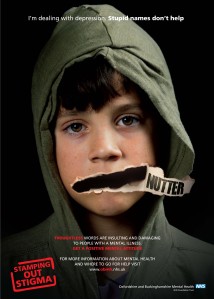The theme of this years Oxford Social Inclusion Cup is “More than Words” and the message that stigma around mental illness and homelessness needs to change. Here are some thoughts around the stigma around mental illness.
For years and years people with mental illness were locked away in Asylums and people even used to pay to come and watch the patients as a form of entertainment.
Mental Health care has moved forward miles and miles since then and now many people with mental illness are living with support in the community working towards their recoveries and many more would have recovered completely. Although the services have moved forward and the public’s perception has changed and will continue to change, STIGMA is still very much alive.
The impact of negative words can be devastating and can “lock” people out of society in the same way that the Asylums used to.
How many newspaper articles have you seen using the words ” nutter” or “psycho”?
How many times have you heard people using these negative words to refer to someone’s behaviour?
So why does stigma still exist? Is it because of poor education around mental illness? For example in many shops you can still buy t-shirts that state “I used to be schizophrenic but we’re ok now”. This statement pokes fun at a serious illness and is factually inaccurate in that people with a diagnosis of Schizophrenia do not have a split mind or two separate identities. So why do people find statements like these acceptable and even amusing? Would there be a t-shirt that says “I had a heart attack but I’m fine now”? Or ” I’m blind what are you looking at”? It’s not right; why is physical illness socially acceptable but mental illness not?
If we look at the facts 1 in 4 people will experience some form of mental health problem in their lifetime. Therefore people who use these negative words are likely to be insulting a member of their family, a work colleague, a friend or even themselves in the future…
Mental illness doesn’t need to be that hard to comprehend. Take depression for example; imagine that day in your life when a close relative died, feel that sadness again, that is a symptom of depression. Add to that a change in your sleep pattern, a lack of appetite and a difficulty in concentrating and you may be diagnosed with depression. It’s something that we can all relate to. And with further education around other mental illnesses they can become relatable too at the end of the day it’s about relating to suffering and that is something that everyone has experienced in their lives.
Mental illness does not have to define somebody in the same way that people who are physically unwell are not defined by their diagnoses. Recovery is alive and well and is being pushed more and more into the forefront of modern mental health care. People can recover, their lives can change and as a result people can become stronger and stronger. When a person is on their journey of recovery do you think that it helps if they are called a nutter? If they are socially outcast from their communities? Or…… would it help if there was no shame? If they could approach their friends and families easily for support? If they could apply for jobs without worrying about discrimination?
SO WHAT CAN YOU DO ABOUT STIGMA?
– Challenge negative language in the press, in the workplace, in your communities.
– Learn more about mental illness
– Speak to your friends and families about these issues
– Join the campaigns that are running in social networks
– Attend events such as the Oxford Social Inclusion Cup
This list is by no means exhaustive and this post by no means expresses all of the impact that stigma can have….but what I hope it does express is the hope that stigma can be irradiated from our society.


